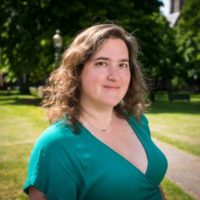Introduction
Musetta Blaauw is an independent entrepreneur and owner of Zon Op Alle Daken, Zon Op Alle Zaken and Zonnescholen with her partner. With these companies, she guides various parties in making a sustainability drive.
sustainability drive
Together with my husband I am involved in guiding social organizations, energy cooperatives, governments and companies to make a sustainable move, especially in solar energy. We are mainly concerned with participation and project supervision to ensure that projects run better and that people are not left to their own devices. We own have the Zon op Alle Daken energy cooperative, in which we have devised a method whereby we not only realize the generation, but also ensure that the proceeds can reach people who are currently unable to participate in the energy transition.
My background is International Business, in which I always had an interest in the government. I also had my doubts about diplomacy, but that was too scientific. I’m really more into the practical implementation. When I have seven projects in front of me, my mind starts to link everything we learn in one project to what we need in the other project. There is also much more of my added value in that.
sustainability drive
I personally think making an impact is very important, and then the techniques I use are less important. Above all, I need to understand and see what we can change for the better. It doesn’t have to be visible, but it must be felt. You have to feel that it adds something and that the time I put into it actually changes lives.
We can make huge strides in the energy transition by throwing down millions of windmills, but they only achieve one or two goals, namely less emissions and more money in their pocket, and that is not enough for me.
I want the money to end up in the area. Especially here in the north of the Netherlands you have villages that are emptying. There is no more employment, which means that the schools are getting worse, so that children who are born in such an empty village are already behind children who are born in, for example, a city like Haarlem. With an energy transition that is locally rooted, you can absorb part of it, but that is of course only one component. There is also too little attention for this from the national government, local authorities are already paying much more attention to this.
Increasing impact
Our companies are now really in a growth phase. Especially now we want to increase the impact, we have already helped 130 schools and can now guide the next 100 schools. In this way you do make progress, those schools are therefore made more sustainable and can invest the money in education and the children who go to school there also see that sustainability is being made, are taught about it and also take it home. This creates a ripple that can have a lot of impact.
Our team was actually not diverse at all, we only have one other man besides my husband, but in the meantime our team has been expanded with two more man and a woman, which has made the male/female ratios a bit straighter. The team now consists of eight womand and four men. I think it would be great to have more people with diverse backgrounds within our company, but if there aren’t yet, it’s difficult to send them.
Teams focused on impact, praticipation and social cohesion like us attract far more women than average in the energy transition, while if you look at the technical side, the executive tasks and where the subsidies go, etc., you only meet men. There really is a sort of dividing line.
Like-minded people
At 75inQ I find like-minded women within the energy transition. That gives room for conversations and that is especially what I am looking for: like-minded people with a different view on things, to learn from them and also to develop myself.


 Katharina Andrés
Katharina Andrés